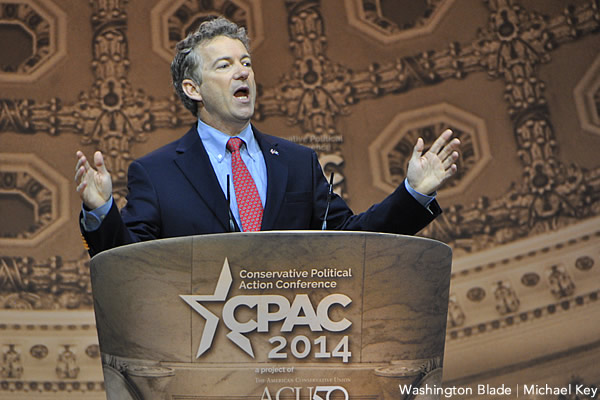News
Conservative struggle over gay rights emerges at CPAC
Santorum says he doesn’t ‘want to talk about redefining marriage’
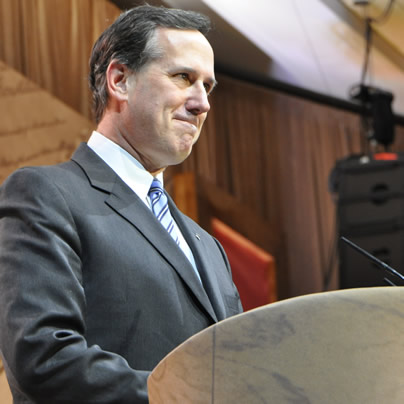
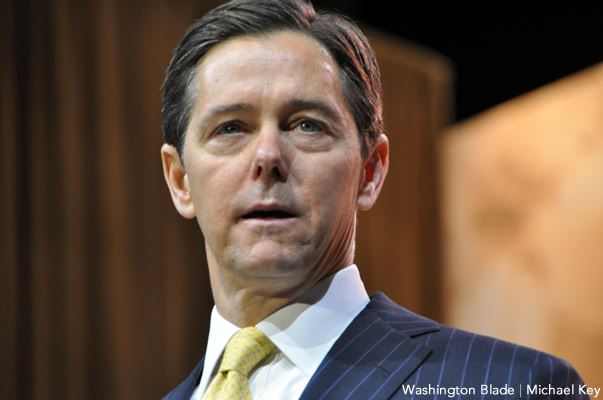
Ralph Reed speaking at the 2014 Conservative Political Action Conference. (Washington Blade photo by Michael Key)
NATIONAL HARBOR, Md. — To witness the conservative movement’s struggle with the widely held perception that nationwide marriage equality is imminent, you need not look further than the stage of the 2014 Conservative Political Action Conference.
After remaining silent on the first day of the conference, voices against same-sex marriage emerged on Friday, although they were restricted to certain conservative activists as others expressed conflict over the issue and elected Republican officials ignored LGBT rights altogether in their speeches.
Ralph Reed, founder of the Faith and Freedom Coalition, was among the most vociferous in his opposition to same-sex marriage as he accused U.S. Attorney General Eric Holder of committing a “brazen act of lawlessness” by counseling state attorneys general not to defend marriage laws against litigation.
It should be noted that during his speech to the National Association of Attorneys General, Holder said he believes it’s OK for state attorneys general not to defend a ban on same-sex marriage if they believe they’re unconstitutional, but he never instructed them to take that course of action.
“From now on, we’re going to accept — in 2014, 2016 and beyond — nothing beyond unapologetic, unalloyed ‘conservative’ that defends the principles upon which this nation was founded, including the biblical principles of freedom of religion, the sanctity of life and the sacred institution of marriage,” Reed continued.
Also injecting anti-gay sentiment before the estimated 8,500 attendees at CPAC was Oliver North, a Fox News commentator known for his role in the Iran-Contra scandal during the Reagan administration in the 1980s.
Ending his speech, North equated the conservative struggle to stop the advancement of marriage equality to abolitionists’ efforts in 19th century America to end slavery.
“Some say that we must ignore social issues, like the definition of marriage, the sanctity of life, religious freedoms,” North said. “I say those are not social issues, they are deeply moral and spiritual issues and should be part of America’s elections.”
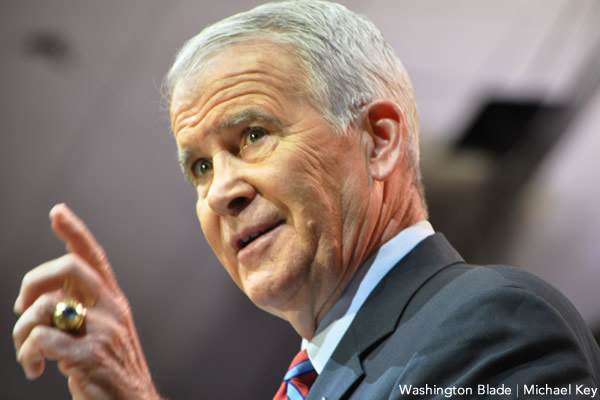
Oliver North speaking at the 2014 Conservative Political Action Conference. (Washington Blade photo by Michael Key)
North also made a veiled criticism of “Don’t Ask, Don’t Tell” repeal, saying the administration is treating U.S. troops like “laboratory rats” as part of a “social experiment.”
These conservative activists are pushing back against the advancement of marriage equality as numerous federal courts — most recently in Texas, Virginia, Kentucky, Utah and Oklahoma — have struck down state constitutional bans on same-sex marriage amid expectations the U.S. Supreme Court will deliver a final ruling on the issue in 2015.
The anticipated resolution of the marriage issue in the courts invoked the ire on stage of Eric Metaxas, a conservative pundit who insisted voters must decide the issue of marriage equality instead of judges.
“The idea of same-sex marriage, the idea of paying for contraceptions, we should let the voters decide,” Metexas said. “This is the United States of America. We don’t need the ‘Mandarins of Justice’ to make these decisions; we’re supposed to trust the voters to make those decisions, and let the voters decide.”
But those considered possible 2016 presidential candidates shied away from the issue of marriage equality.
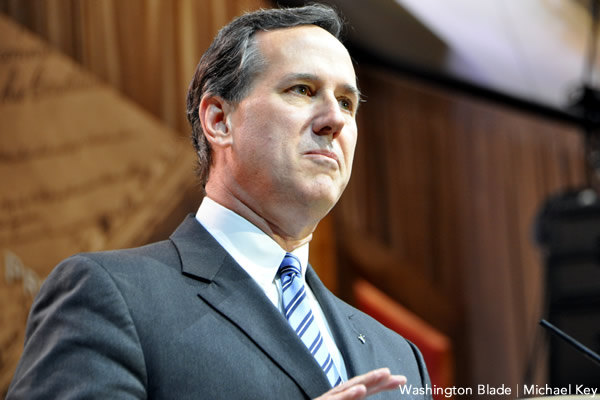
Former Sen. Rick Santorum (R-Pa.) speaking at the 2014 Conservative Political Action Conference. (Washington Blade photo by Michael Key)
Rick Santorum, known for his opposition to same-sex marriage and support for a U.S. constitutional amendment banning same-sex marriage, expressed regret on stage that he became known for that viewpoint over the course of his 2012 presidential bid.
“I don’t want to talk about redefining marriage; I want to talk about reclaiming marriage as a good for society and celebrating how important it is for our economy,” Santorum said to applause.
Santorum continued to discuss the importance of the institution of marriage itself, saying businesses could advance it by offering marriage counseling as a benefit.
Amid the (often disputed) perception that Pope Francis is more lenient on gay rights, particularly after his recent suggestion he could support civil unions, Santorum, who’s Catholic, commended the pontiff for saying the Catholic Church should steer away from social issues.
“He’s going out there and not talking about what the Christian faith is against, he’s going out there and talking about what we’re for,” Santorum said. “He hasn’t changed a single policy. He won’t change a single policy. But what he’ll do is he’ll go out there and talk about the good news to a hurting world because he believes that that’s what the world needs.”
One event at CPAC that demonstrated the tension within the conservative movement on marriage equality, although the discussion wasn’t completely dedicated to the issue, was a panel titled, “Can Libertarians and Social Conservatives Ever Get Along?”
One question debated was protecting religious liberties of individuals as marriage equality advances. The issue for panelists wasn’t so much whether there should be marriage equality, but whether it should be imposed by judicial fiat.
Michael Medved, a conservative pundit and host of “The Michael Medved Show,” said the issue has come down to religious liberty and insisted social conservatives and libertarians should agree that states should be able to decide for themselves the marriage issue without interference from the federal government.
“The idea that New York and California may have legitimated, or recognized, decided that those states should sponsor gay marriage doesn’t mean that Texas should be compelled by overreaching courts, or anyone else, to sponsor and legitimate gay marriage,” Medved said.
Alexander McCorbin, executive director of Students for Liberty, represented the opposite end of the conservative spectrum and said on the panel that marriage equality is “the civil rights issue of the 21st century.”
“There’s state-sponsored discrimination against various associations between individuals,” McCorbin said. “We’re talking about the denial of basic rights and privileges of individuals in committed relationships — the only difference being their sexual orientation.”
But McCorbin was rebuked on stage by Medved, who said believing a fundamental right to same-sex marriage is inconsistent with libertarianism.
“You are saying that nine unelected judges should impose their will and their judgement on the sovereign states, all 50 sovereign states and the citizens therein, in terms of something as fundamental to society as the definition of family and the definition of marriage,” Medved said.
Making a point that was derided by gay bloggers and the watchdog group Media Matters, Medved also said the idea that any state had prohibited same-sex marriage is “a liberal lie” — possibly because same-sex weddings have been allowed, even though 33 states don’t recognize them as valid.
But Medved also signaled he nonetheless supports adoption by same-sex parents, which triggered applause in the audience (although one observer could be heard booing).
Matthew Spaulding, associate vice president of Allen P. Kirby Jr. Center for Constitutional Studies & Citizenship, insisted that religious liberties for objectors must be upheld and denied any link between same-sex marriage and interracial marriage.
“The fact of one’s color of one’s skin is a coincidence,” Spaulding said. “It has nothing to do with your character, right? The difference between a male and a female is something that is self-evident and obvious that we need to deal, and we can’t shut aside and turn it over to judges to tell us what to do.”
No one who is gay, nor any LGBT political group, had a voice on the panel despite its attention to the marriage issue. In an op-ed penned earlier this week in the Daily Caller, Log Cabin Republicans executive director Gregory Angelo asserted he had sought participation on a CPAC panel this year, but was rebuffed because the American Conservative Union, which runs the event, never responded to the request.
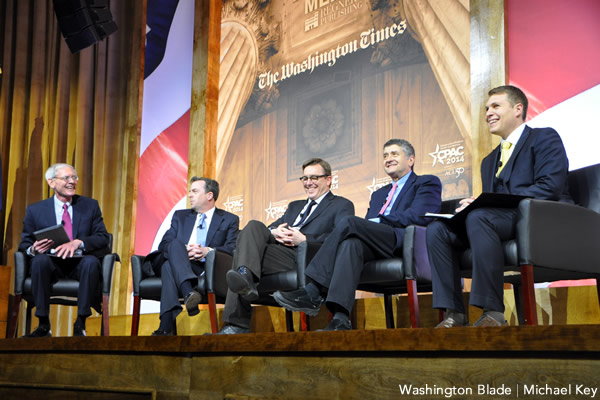
Members of the CPAC panel, ‘Can Libertarians and Social Conservatives Ever Get Along?’ discussed same-sex marriage. From left, Tom Minnery of CitizenLink, Matt Spaulding of the Allen P. Kirby Jr. Center for Constitutional Studies & Citizenship, Matt Welch of Reason Magazine, Michael Medved of the ‘Michael Medved Show’ and Alexander McCorbin of Students for Liberty. (Washington Blade photo by Michael Key)
Ignoring the issue of marriage, prominent Republicans speaking before the panel chose to tackle other issues, although they weren’t afraid to take Obama to task.
Texas Gov. Rick Perry, a known opponent of LGBT rights including allowing openly gay people in the Boy Scouts, turned his attention to deriding the advancement of welfare states under the Obama administration.
“The vision that wins out — either this big-government, protectionist nanny state version offered by liberal leaders or the limited-government, unsubsidized, freedom state offered by conservative leaders — will determine the future of our nation,” Perry said.
Sen. Rand Paul (R-Ky.), who has a reputation as a libertarian, delivered a speech criticizing the exposed data collection by the National Security Agency as he urged adherence to the U.S. Constitution.
“There is a great battle going on, it’s for the heart and soul of America,” Paul said. “The Fourth Amendment is equally as important as the Second Amendment, and conservatives cannot forget this.”
Even 2008 Republican presidential candidate turned Fox News commentator Mike Huckabee, known for championing social issues, was silent on stage about the issue of marriage equality, although he spoke more generally about upholding religious liberties in the country.
This struggle over gay rights emerges at CPAC following the publication this week of a Washington Post-ABC News poll showing a record-high 59 percent of Americans support same-sex marriage, while only one-in-three Americans oppose it.
That support is even higher among young voters, which make up the preponderance of attendees at CPAC. The poll found three-quarters of Americans younger than 30 support same-sex marriage.
Following the speeches on Friday, Log Cabin’s Angelo said there’s only one way for the debate to end if the conservative movement wants to thrive.
“The conservative movement can keep its head in the sand at its own peril — with the potential to lose more votes — or it can acknowledge us as here to stay, and grow the base, especially among millennial voters,” Angelo said. “That’s where we’re at in this movement. We want conservatives to win, but they need to acknowledge us as part of that winning coalition.”
New York
Two teens shot steps from Stonewall Inn after NYC Pride parade
One of the victims remains in critical condition

On Sunday night, following the annual NYC Pride March, two girls were shot in Sheridan Square, feet away from the historic Stonewall Inn.
According to an NYPD report, the two girls, aged 16 and 17, were shot around 10:15 p.m. as Pride festivities began to wind down. The 16-year-old was struck in the head and, according to police sources, is said to be in critical condition, while the 17-year-old was said to be in stable condition.
The Washington Blade confirmed with the NYPD the details from the police reports and learned no arrests had been made as of noon Monday.
The shooting took place in the Greenwich Village neighborhood of Manhattan, mere feet away from the most famous gay bar in the city — if not the world — the Stonewall Inn. Earlier that day, hundreds of thousands of people marched down Christopher Street to celebrate 55 years of LGBTQ people standing up for their rights.
In June 1969, after police raided the Stonewall Inn, members of the LGBTQ community pushed back, sparking what became known as the Stonewall riots. Over the course of two days, LGBTQ New Yorkers protested the discriminatory policing of queer spaces across the city and mobilized to speak out — and throw bottles if need be — at officers attempting to suppress their existence.
The following year, LGBTQ people returned to the Stonewall Inn and marched through the same streets where queer New Yorkers had been arrested, marking the first “Gay Pride March” in history and declaring that LGBTQ people were not going anywhere.
New York State Assemblywoman Deborah Glick, whose district includes Greenwich Village, took to social media to comment on the shooting.
“After decades of peaceful Pride celebrations — this year gun fire and two people shot near the Stonewall Inn is a reminder that gun violence is everywhere,” the lesbian lawmaker said on X. “Guns are a problem despite the NRA BS.”
India
Anaya Bangar challenges ban on trans women in female cricket teams
Former Indian cricketer Sanjay Bangar’s daughter has received support

Anaya Bangar, the daughter of former Indian cricketer Sanjay Bangar, has partnered with the Manchester Metropolitan University Institute of Sport in the U.K. to assess her physiological profile following her gender-affirming surgery and undergoing hormone replacement therapy.
From January to March 2025, the 23-year-old underwent an eight-week research project that measured her glucose levels, oxygen uptake, muscle mass, strength, and endurance after extensive training.
The results, shared via Instagram, revealed her metrics align with those of cisgender female athletes, positioning her as eligible for women’s cricket under current scientific standards. Bangar’s findings challenge the International Cricket Council’s 2023 ban on transgender athletes in women’s cricket, prompting her to call for a science-based dialogue with the Board of Control for Cricket in India and the ICC to reform policies for transgender inclusion.
“I am talking with scientific evidence in my hand,” Bangar said in an interview posted to her Instagram page. “So, I hope, this makes an impact and I will be hoping to BCCI and ICC talking with me and discussing this further.”
On Nov. 21, 2023, the ICC enacted a controversial policy barring trans women from international women’s cricket. Finalized after a board meeting in Ahmedabad, India, the regulation prohibits any trans player who has experienced male puberty from competing, irrespective of gender-affirming surgery or hormone therapy. Developed through a 9-month consultation led by the ICC’s Medical Advisory Committee, the rule aims to safeguard the “integrity, safety, and fairness” of women’s cricket but has drawn criticism for excluding athletes like Canada’s Danielle McGahey, the first trans woman to play internationally. The policy, which allows domestic boards to set their own rules, is slated for review by November 2025.
Bangar shared a document on social media verifying her participation in a physiological study at the Manchester Metropolitan University Institute of Sport, conducted from Jan. 20 to March 3, 2025, focused on cricket performance. The report confirmed that her vital metrics — including haemoglobin, blood glucose, peak power, and mean power — aligned with those of cisgender female athletes. Initially, her fasting blood glucose measured 6.1 mmol/L, slightly above the typical non-diabetic range of 4.0–5.9 mmol/L, but subsequent tests showed it normalized, reinforcing the study’s findings that her physical profile meets female athletic standards.
“I am submitting this to the BCCI and ICC, with full transparency and hope,” said Bangar. “My only intention is to start a conversation based on facts not fear. To build space, not divide it.”
In a letter to the BCCI and the ICC, Bangar emphasized her test results from the Manchester Metropolitan University study. She explained that the research aimed to assess how hormone therapy had influenced her strength, stamina, haemoglobin, glucose levels, and overall performance, benchmarked directly against cisgender female athletic standards.
Bangar’s letter to the BCCI and the ICC clarified the Manchester study was not intended as a political statement but as a catalyst for a science-driven dialogue on fairness and inclusion in cricket. She emphasized the importance of prioritizing empirical data over assumptions to shape equitable policies for trans athletes in the sport.
Bangar urged the BCCI, the world’s most influential cricket authority, to initiate a formal dialogue on trans women’s inclusion in women’s cricket, rooted in medical science, performance metrics, and ethical fairness. She called for the exploration of eligibility pathways based on sport-specific criteria, such as haemoglobin thresholds, testosterone suppression timelines, and standardized performance testing. Additionally, she advocated for collaboration with experts, athletes, and legal advisors to develop policies that balance inclusivity with competitive integrity.
“I am releasing my report and story publicly not for sympathy, but for truth. Because inclusion does not mean ignoring fairness, it means measuring it, transparently and responsibly,” said Bangar in a letter to the BCCI. “I would deeply appreciate the opportunity to meet with you or a representative of the BCCI or ICC to present my findings, discuss possible policy pathways, and work towards a future where every athlete is evaluated based on real data, not outdated perceptions.”
Before her transition, Bangar competed for Islam Gymkhana in Mumbai and Hinckley Cricket Club in the U.K., showcasing her talent in domestic cricket circuits. Her father, Sanjay Bangar, was a dependable all-rounder for the Indian national cricket team from 2001 to 2004, playing 12 test matches and 15 One Day Internationals. He later served as a batting coach for the Indian team from 2014 to 2019, contributing to its strategic development.
Cricket in India is a cultural phenomenon, commanding a fanbase of more than 1 billion, with more than 80 percent of global cricket viewership originating from the country.
The International Cricket Council, the sport’s governing body, oversees 12 full member nations and more than 90 associate members, with the U.S. recently gaining associate member status in 2019 and co-hosting the 2024 ICC Men’s T20 World Cup. The BCCI generated approximately $2.25 billion in revenue in the 2023–24 financial year, primarily from the Indian Premier League, bilateral series, and ICC revenue sharing. The ICC earns over $3 billion from media rights in India alone for the 2024–27 cycle, contributing nearly 90 percent of its global media rights revenue, with the BCCI receiving 38.5 percent of the ICC’s annual earnings, approximately $231 million per year.
Women’s cricket in India enjoys a growing fanbase, with over 300 million viewers for the Women’s Premier League in 2024, making it a significant driver of the sport’s global popularity. The International Cricket Council oversees women’s cricket in 12 full member nations and over 90 associate members, with the U.S. fielding a women’s team since gaining associate status in 2019 and competing in ICC events like the 2024 Women’s T20 World Cup qualifiers. The BCCI invests heavily in women’s cricket, allocating approximately $60 million annually to the WPL and domestic programs in 2024–25, while contributing to the ICC’s $20 million budget for women’s cricket development globally. India’s media market for women’s cricket, including WPL broadcasting rights, generated $120 million in 2024, accounting for over 50 percent of the ICC’s women’s cricket media revenue.
“As a woman, I feel when someone says that they are women, then they are, be trans or cis. A trans woman is definitely the same as a cis woman emotionally and in vitals, and specially, when someone is on hormone replacement therapy. Stopping Anaya Bangar from playing is discrimination and violation of her rights. It is really sad and painful that every transwoman need to fight and prove their identity everywhere,” said Indrani Chakraborty, an LGBTQ rights activist and a mother of a trans woman. “If ICC and BCCI is stopping her from playing for being transgender, then I will say this to be their lack of awareness and of course the social mindsets which deny acceptance.”
Chakraborty told the Blade that Bangar is an asset, no matter what. She said that the women’s cricket team will only benefit by participation, but the discriminating policies are the hindrance.
“Actually the transgender community face such discrimination in every sphere. In spite of being potent, they face rejection. This is highly inhuman. These attitudes is regressive and will never let to prosper. Are we really in 2025?,” said Chakraborty. “We, our mindset and the society are the issues. We, as a whole, need to get aware and have to come together for getting justice for Anaya. If today, we remain silent, the entire community will be oppressed. Proper knowledge of gender issues need to be understood.”
The BCCI and the International Cricket Council have not responded to the Blade’s repeated requests for comment.
New York
Zohran Mamdani participates in NYC Pride parade
Mayoral candidate has detailed LGBTQ rights platform

Zohran Mamdani, the candidate for mayor of New York City who pulled a surprise victory in the primary contest last week, walked in the city’s Pride parade on Sunday.
The Democratic Socialist and New York State Assembly member published photos on social media with New York Attorney General Letitia James, telling followers it was “a joy to march in NYC Pride with the people’s champ” and to “see so many friends on this gorgeous day.”
“Happy Pride NYC,” he wrote, adding a rainbow emoji.
Mamdani’s platform includes a detailed plan for LGBTQ people who “across the United States are facing an increasingly hostile political environment.”
His campaign website explains: “New York City must be a refuge for LGBTQIA+ people, but private institutions in our own city have already started capitulating to Trump’s assault on trans rights.
“Meanwhile, the cost of living crisis confronting working class people across the city hits the LGBTQIA+ community particularly hard, with higher rates of unemployment and homelessness than the rest of the city.”
“The Mamdani administration will protect LGBTQIA+ New Yorkers by expanding and protecting gender-affirming care citywide, making NYC an LGBTQIA+ sanctuary city, and creating the Office of LGBTQIA+ Affairs.”
-

 U.S. Supreme Court4 days ago
U.S. Supreme Court4 days agoSupreme Court upholds ACA rule that makes PrEP, other preventative care free
-

 U.S. Supreme Court4 days ago
U.S. Supreme Court4 days agoSupreme Court rules parents must have option to opt children out of LGBTQ-specific lessons
-

 National5 days ago
National5 days agoEvan Wolfson on the 10-year legacy of marriage equality
-

 Congress5 days ago
Congress5 days agoSenate parliamentarian orders removal of gender-affirming care ban from GOP reconciliation bill

